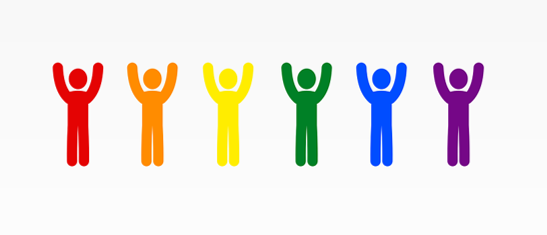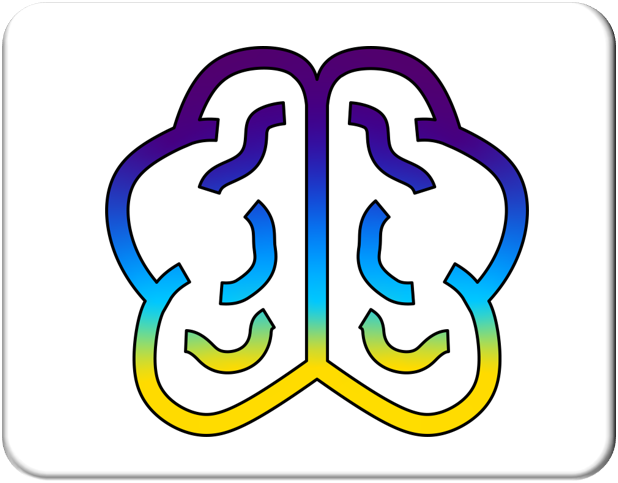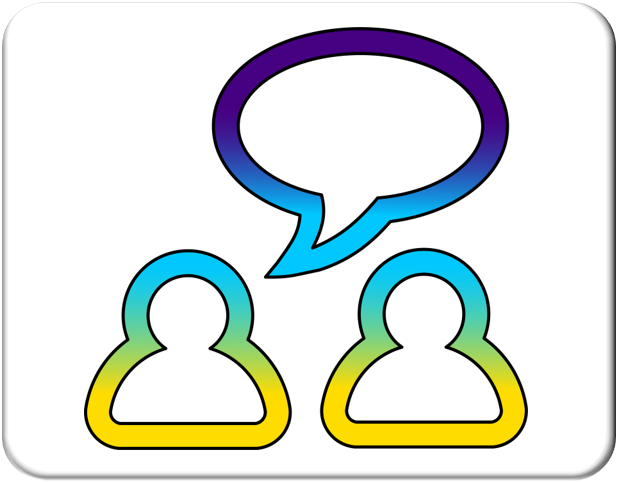Queer Loneliness
Feeling lonely is something that impacts people in the queer community a lot, regardless of whether you’re 12, 20 or 70, regardless of whether you’re out or closeted, whether you got bullied or straight-up accepted, whether you can legally get married & change your name and regardless of how many people out there say it’s OK to be who you are.
Regardless of all our collective, varied experiences – loneliness is something we all still seem to experience from time to time.
Often it's assumed there's a magical formula that will take loneliness out of the equation. Something like;
feeling lonely + meeting heaps of people = not lonely anymore
Feels nice and logical, right? Is that all there is to it? Did… Did we just fix it? Well in some ways that might make a ton of difference, sure. But it’s also much more than that….
The literal side of feeling alone
It can definitely feel you’re in the minority sometimes and you might even be the only queer person you know, or the only one in your year, school or even neighbourhood. That is, quite literally, a lonely place to be.
If you’re not “out” there’s an extra barrier there too. There’s a niggling sense that even if you are close to someone, they might not be seeing the “whole you” – they’re not connecting with what’s possibly the most vulnerable bit of you. Research from Queer Futures says hiding part of yourself in various situations is one of the biggest causes of poor wellbeing for queer young people, and loneliness is part of that.
But, there’s stuff we can do about that!
And yes, coming out is one those things, but it doesn’t have to be the first thing. There are a number of ways to be yourself, but they all have one thing in common; being a bit vulnerable. And that can be scary – so scary, in fact, that most adults haven’t got the hang of it and avoid it at all costs... And funnily enough, it means a lot are still feeling lonely.
Truth is though, people can only connect to what you show them. If you only show them filtered Instagram feeds and last minute homework answers and rare Fortnite skins, that’s what they’ll connect with. If you get older and you only show people semi-naked Grindr profiles and witty put-downs and make-up tips, that’s still all people can connect to.
There’s nothing necessarily wrong with any of those things, but building more meaningful connections with others means you have to give them something more to connect to.
These things mean being brave, and being a bit vulnerable, and if you’re not ready yet, then that’s OK. But when you are, they might help.

Youth Groups
You can meet other queer young people without coming out to friends and family and, for a lot of people, meeting others first helped them to make that step. If you’ve got an LGBTQ+ Youth Group near you (and if you’re in Greater Manchester you definitely do – in fact there’s a surprising amount of them up and down the country) then go to it.
It might not be your cup of tea and walking through that door might be the scariest thing in the world but it’s really, really worth trying one, even if you only go once!
Many of us have been there; have done laps around the block, building up the courage to go inside a youth group. One thing that might help is reaching out to the youth worker first and meeting them beforehand.
The weird and wonderful world of the web
If turning up at a youth group feels a bit much that’s OK. There’s also a bunch of stuff online that might help too. And no, not dating apps or any of that (we’ll get to them…).
Seeing other people your age might help give you a boost – there’s tons of YouTubers out there talking openly about their experiences, good and bad, and just being themselves. It can be great to get lost in them sometimes (although maybe stop short of getting sucked into comments... nothing good comes from reading the comments!).
There’s also loads of people to talk to online. There are forums filled with young queer people at Childline (a little shy of 8000 threads to be precise!) and trans specific forums at Mermaids.
Sometimes people create a second account on Instagram, Snapchat, Reddit, Tumblr (or whatever your preference is) where they can join LGBTQ+ groups and talk more openly about how they’re feeling.
If you do want to connect to people online then be sensible though. Don’t give out personal details or information and just be mindful people might not always be who they say they are. If things go wrong or you get worried about something you see online then go to www.thinkuknow.co.uk for information or report it directly at www.ceop.police.uk/Safety-Centre.

Coming Out
So finding a space, IRL or URL, to be yourself can be great. But maybe it’s not all you need, or maybe it’s just not a practical option.
Maybe coming out where you are, with people already in your life is something you feel is right.
If you come out then there’s always a fear you’ll encounter some… “unenlightened” views from certain parts of society or maybe people won’t want to know the “real you” anymore, and that’s a pretty scary thought.
But it might also mean people see you properly for the first time, and that can be amazing.
If you are thinking about coming out, that’s fantastic and there some advice and tips here. Only you can make that decision though and you should never feel pressured to do it before you’re ready (or to do it if you don’t feel it’s safe to do so where you are).
Just remember, your situation is unique to you but there are thousands of people your age wrestling with whether or not to come out every day. They know a lot of what you’re feeling and if you do decide to come out, maybe picture them all with you. Because even if you do feel lonely right now there’s loads of people who know what you’re going through and so many that have made it through the other side!
All Sorted?!
OK, so you can find others. What then? Does that mean loneliness goes away? If so, why is there an entire population of queer people out there lucky enough to have a community, or even live in country that gives them loads of rights, who still feel lonely?
It’s not an easy thing to unpick, but here’s a few thoughts about the pitfalls we can fall into…
Quick fixes
One perfectly human and totally understandable thing we all do is hunt for easier things instead of that whole scary “being vulnerable” thing.
That might mean doing different things for different people, but what those things will probably all have in common is they pretend to give the same buzz that more substantial connections do. They look like they’ll fill that void, and for a while they could – it’s daft to pretend they don’t do anything at all, people wouldn’t do them if they didn’t offer something, but what they don’t do is fix that problem of loneliness.

Carrying that closet
At one point of another, we’re all “in the closet” (because society largely still much assumes everyone is straight and cisgender till proven otherwise). Some of us might only stay in that closet for a short time, for others it might feel like a lifetime. Sometimes, we carry that closet around with us, long after we’ve come out.
Whilst we’re in that closet we're often telling ourselves, one way or another, that who we are isn’t OK or isn't enough for those around us and if they knew who we were we'd be rejected. Sometimes, that message can sink in a bit too deep. It can hide somewhere we can’t see and it can pick at us without us noticing, even after we've come out of that closet.
What has that got to do with loneliness?
Well if nasty thoughts like “who I am isn’t OK” lurk around they’re probably going to stop us being vulnerable. If we don’t think we’re “good enough”, for whatever reason that might be, we’re hardly going to be in a rush to put ourselves out there in an honest and open way. This feeling is called "shame" and it's very, very destructive.
That's often what gets in the way of us making those real connections with others. It some ways, it can cause us to isolate ourselves.
Ru Paul probably said it best; “If you can’t love yourself how the hell you gonna love someone else?!”
And that message is one of the reasons we still have Pride events. That thought, that feeling, that who you are isn’t OK – well it can’t survive if you’re feeling proud. Looking at yourself in the mirror and thinking “Yeah, I am proud of who I am” is hard for a lot of people, whether they’re queer or not, but Pride events should be there to help that journey along because all the amazing strides towards equality in many parts of the world don’t always reach that place where those thoughts hide.
One way of shaking off that closet is to go to a mirror and say your name and say whatever your identity is. Then tell yourself who you are is OK and that you love yourself and that hell yeah, you’re proud of who that is. And mean it!
Might be real tough to do the first time, and sometimes the second and third too… But keep telling yourself it!
If you want to read more about this topic there's a great book by Matthew Todd called "Straight Jacket" that talks about some ways to address those feelings of shame.
Connecting with yourself
You’re an amazing human, with loads of complicated and wonderful sides to your personality and identity. It might be worth spending some time with yourself and getting comfortable and relaxed with who you are.
That whole “If you can’t love yourself how the hell you gonna love somebody else??” line from before? Well, you kind of need to know a bit about yourself before you can start loving yourself.
For some of us the thought of sitting with ourselves and getting to know ourselves better is actually scarier than getting out there and cramming loads of other people into our lives. It might not be something you’re ready to run head first into and that's OK. If you'd like to talk to someone about that journey, 42nd Street is here for that along with our own groups and those across the country.
Some things that might help could be; trying out a bunch of random hobbies and activities and see what you enjoy. Spending some short chilled out moments in your room (or anywhere for that matter) where you just listen to music and let your mind go where it wants. Making a list of all the things you’d like to do in your life, no matter how “out there” it gets.
Get excited about all the bits and pieces that make up who you are – no one else has them in the combination you do, and that is brilliantly unique!






